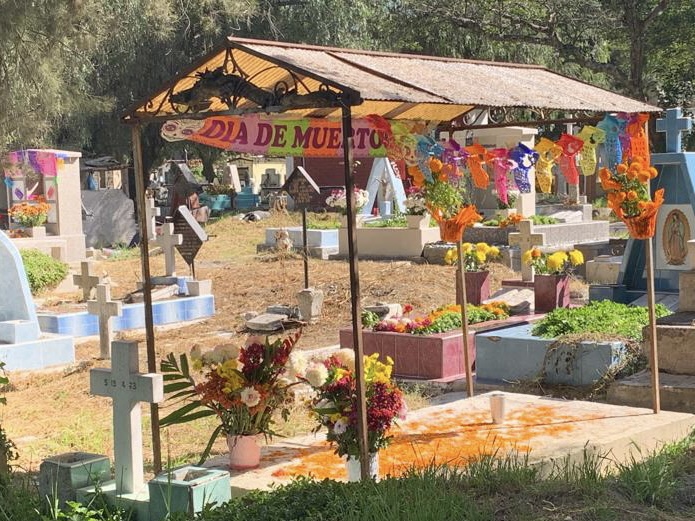The Day of The Dead, Mexico City

The funeral home in town has recently changed its name. It is now a “Life Celebration Home.” We are a death-avoidant culture. And the church is, often, little better. Many are deep-sixing funerals for “Life Celebrations.” The irony, the unintended sadness, is that the more we try to banish death, the more troubled about death we become. I think of a recent bride as we were reading the vows at the rehearsal. At “till death do us part” she paused for a long time, then looked at me, troubled, and said, “Do I have to say death on my wedding day?”
On this All Souls Day I am in Mexico City for El Día de Muertos, the Day of the Dead. There are no Life Celebration Homes here. Death is treated as part of life, mysterious and awesome, beyond our knowing and control, not to be feared but embraced. In homes, people create an ofrenda, an altar to honor their dead. There are pictures of their loved ones, a pitcher of water and the favorite food and drink of the dead, all decorated with orange bursts of marigolds.
I walk through Panteón Civil de Dolores, the largest cemetery in Mexico City, where families gather on the Day of the Dead. Moms, Dads, kids, grandparents. They decorate the graveside, set up tables of food, bring a boom box or hire musicians to play traditional music. It’s a ritual meal, where the dead partake spiritually of the food and drink and enjoy being with their families. I look at the children, romping near the graves, and I think, Where I was raised, children were not taken to funerals.
Sometimes we have to leave home to see in a different light. Every time we recite the Nicene Creed we affirm our faith in “the communion of saints,” the dazzling truth that when we partake of the Eucharist we are joined in the meal by the hosts of heaven, our plain, ordinary, saintly loved ones among them. But we’ve mostly lost touch with our dead. We don’t think of ourselves as eating and drinking with Mom and Pop and Uncle Ed. But we are, just like those families in the cemetery.
“The dead are not distant or absent,” writes John O’Donohue. “They are alongside us. When we lose someone to death, we lose their physical image and presence, they slip out of visible form into invisible presence.”
So true about our society being death avoidant. One of the best things my parents did for me and my siblings when we were young was to be honest about death, and to take us to visiting hours or the funerals – or give us the choice to go. Most of my friends weren’t so fortunate, and most had a really hard time when they were adults and were faced with the death of a loved one.
Thanks, David!
That was a gift—as I said, my first funeral—I was in high school. So, like your parents, I made sure our daughters went early to funerals and wakes.
Oh, I loved the story of the bride. What a gem. How did you answer her question?
Just this past week, at the retreat, I started writing an affirmation about death. It’s still in draft form. I’ve got “welcoming” in there but “embracing” is better. I’ll use that.
One of my reasons for affirming death is so that I can be present to myself and others at the great transition. Even at the edge, I want to be aware, “digging deep into the actual.” As I take in my last breath, I want to breathe out a blessing to all around.
One of the great gifts of the Christian faith is the directness in our liturgies. In the BCP, “death” and “dead” appear 319 times (of course that reflects Rites I and II). And there’s also “die” and “died” –78 each.
The only time we encounter “passing away” is in this collect:
“Grant us, Lord, not to be anxious about earthly things, but to love things heavenly; and even now, while we are placed among things that are passing away, to hold fast to those that shall endure; through Jesus Christ our Lord, who lives and reigns with you and the Holy Spirit, one God, for ever and ever. Amen.”
I love that. Things pass away. People die.
Blessings, David. Your post was just what I needed today, a capstone to my work in progress.
Ha! Well, I told her she would be fine—it wouldn’t kill her. 😀
I’m really moved by your affirmation of death, and your will to embrace it. I share these thoughts on death because I am much more afraid of death than I thought. I have to give myself to this.
So maybe one day, with blessed Francis, we can sing of “Sister Death.”
I wish I had a nickel for every time I’ve heard a priest go on about a big party in heaven, great wine, meeting all our friends and relations, swapping stories, having an celebration, etc. This is folk religion but people are hearing it. In church. The challenge, as ever, is to be explicit about the reality of death in the hopeful context of the Christian faith. Being a “happy welcoming community” seldom translates to good formation. The good folks in Mexico are on to something from which we might learn.
Yes, the folks in Mexico are onto something. As always, it helps to get out beyond the boundaries of our own culture and traditions—and experience something radically different. Doesn’t mean we all have to do Day of the Dead in America, but asking, What can we learn from the Mexican embrace of death that can invigorate our own approach to death, dying, and rising again?
Beautiful; thank you David
Thanks, Roger